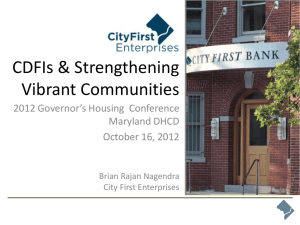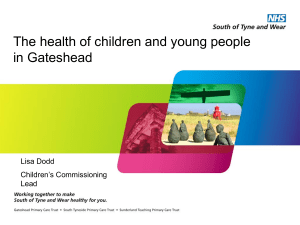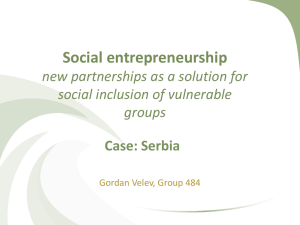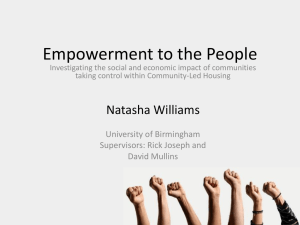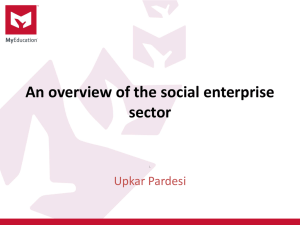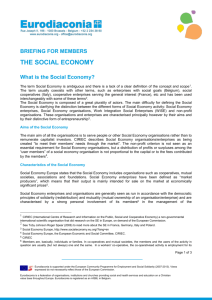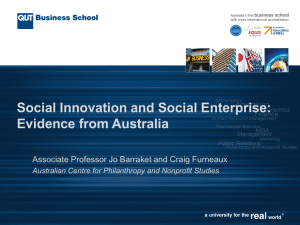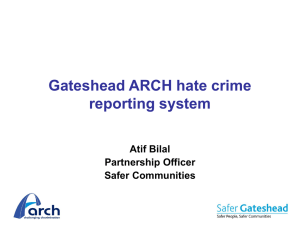What is a Social Enterprise?
advertisement
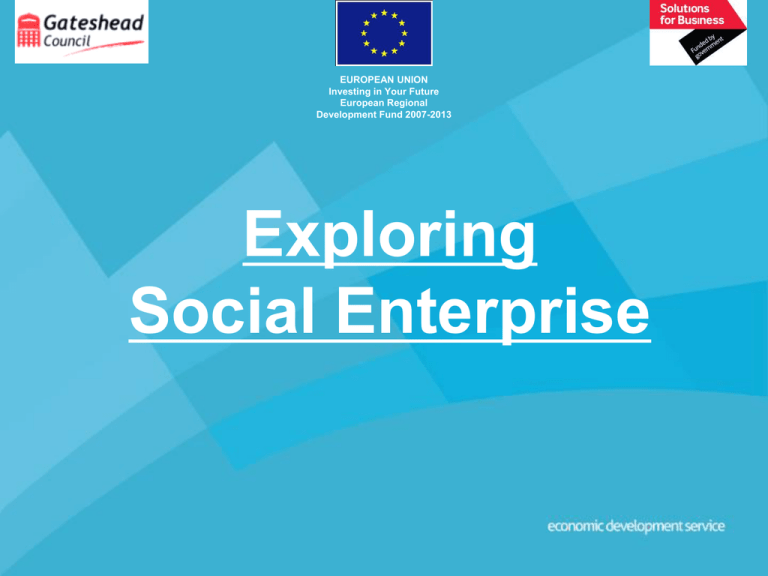
EUROPEAN UNION Investing in Your Future European Regional Development Fund 2007-2013 Exploring Social Enterprise Social Enterprise in Context Government Policy The Big Society The Big Society has 4 main elements • Empowering and shifting power to local communities, to tailor approaches to meet local circumstances • Encouraging people and business to take an actives role in their communities • Transferring power from central to local government • Opening up public services, including enabling mutual social enterprises to engage activity in the delivery of social services, including the “Right to Provide” What is a Social Enterprise? A social enterprise is a business with primarily social aims, and whose profits are reinvested back into its services or the community. Social enterprises are distinctive from traditional charities or voluntary organisations in that they generate the majority, of their income through the trading of goods or services rather than through donations. Who are social entrepreneurs? • People like YOU who; – Have an innovative solution to a local problem / need – Want to make a difference – Want to create social change A Social Enterprise is a Business Like all businesses social enterprises must have •A business plan •A financial strategy •A sustainable trading income stream •Robust systems in place to comply with company law, insurance requirements, VAT etc •Good management and leadership •Recognised Legal Structure Social Enterprise in the UK UK hosts an estimated 62,000 social enterprises which contribute £24bn to UK output. Social Enterprise in Gateshead • • • • • • Actively supports over 80 social enterprises in Gateshead Approximately 350 local jobs Benefits approximately 15000 local people Social Enterprises across all sectors Help to develop 8 new social enterprises per year Currently supporting 33 potential social entrepreneurs to explore and develop their business ideas Social Enterprise in Gateshead Examples • Gateshead Food Co-op CIC • Happy to Help • Renew North East • North East Counselling Services Employee Mutuals • An organisation owned by members made up in part or entirely by the employees • Mutual organisations exist for the principal purpose of delivering a benefit to their members. • Members can be employees, customers, other key stakeholders, or some combination of all three Employee Mutuals • Principles: – Pursuit of profit is not the sole reason for existence. – Shared ownership, – Democratic accountability – Governance structures that ensure members have control over the organisation’s direction and decisionmaking. Spectrum of Mutual's • Employee Owned – eg John Lewis Partnership • Consumer Owned – eg The Co-operative Group Community of Interest • “ A group of people that can be identified by common social, political, economic, or ethnic similarities. • “ A community is a group of people who form relationships over time by interacting regularly around shared experiences.” Legal Structures for Third Sector Organisations • Mutual – Charity – Community Benefit Society – Company Limited by Guarantee – Co-operative – Community – Limited Liability Interest Company Partnership • Social Enterprise The Right to Provide • Public sector workers are given a new right to form employee-owned co-operatives to bid to take over services they deliver • Aimed at empowering workers to deliver better services and control their organisations • Proposals need to: – Deliver savings – Maintain or improve service quality – Prove their capability • Possible opportunity for Gateshead post Pathfinders The Pathfinders 12 pathfinders including; •Development of an employee led youth support service in Kensington & Chelsea •Integration of Community Health and Adult Social Services in Swindon •Development of an employee led Trust to run an agricultural college in Cumbria •NHS employees forming a social enterprise to provide joined up support for homeless people in Leicester Right to Request • Introduced in 2008, closed September 2010 • Invited proposals from staff to form employee-led social enterprise to help transform local health and social care services. • Right to Request freed staff to use front-line expertise to structure services around what really works for patients. • Outcomes – 61 innovative social enterprises created – Delivers £900m worth of services – Employers 25,000 former NHS staff Right to Request Examples • Community Dental Services (Bedfordshire) delivering services to vulnerable people who don’t have regular access to oral health care • Spectrum Community Health CIC (Wakefield) delivering general medical services, health promotion and wellbeing interventions to hard to reach communities. • Care Trust Plus (Lincolnshire) delivering mental health services for older people Discussion Is social enterprise an opportunity for you? SWOT Analysis


